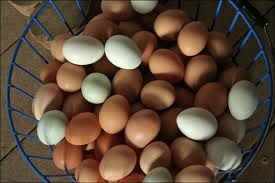 Q. Should wash my eggs in hot water?
Q. Should wash my eggs in hot water?
A. No, you will wash off the bloom and possibly transfer bacteria from the outside to the inside!
When a chicken lays an egg, there is a microscopically thin membrane that covers the shell. This membrane is called "the bloom". The bloom actually blocks the pores that allow air and germs to transfer into an egg, causing aging and possible contamination. Eventually, the bloom will wear away because of handling, etc, allowing air to transfer into the egg - and maybe some other stuff, too. Leaving an egg unwashed allows the bloom to do its job.
Q. How do I clean my eggs if they are dirty?
A. Use a fine grit sandpaper to buff off the dirt. Or use the abrasive part of the sponge. Make sure that sponge is used exclusively for this purpose and it never touches dishes, sink, or counter. Salmonella is a bacterium found in chicken manure and you should be cautious of it in your kitchen.
Also try to scrub the dirt away from the egg rather than scrubbing down onto the egg. You could push harmful bacteria into the porous shell.
Q. Eggs need to be refrigerated, right?
A. No, they don't. The average egg, if left unwashed, can be stored on your kitchen counter in a bowl for up to two weeks prior to having any obvious aging effects.
Q. How long are eggs good for? A. Eggs last about 4-5 weeks in your refrigerator. If you don't know how long the egg has been in the refrigerator, fill a cup with water (enough to cover the egg), and put the egg in the cup. If the egg sinks to the bottom, it is still good to eat; if the egg floats, however, it is bad and should be discarded.
Q. Why does the egg yolk turns greenish gray when overcooked?
A. The sulphur in egg white reacts with the iron in egg yolk when the egg is heated. They react with each other and *BOOM* we observe the gray coloration on the egg yolk.
*Blog reference www.chickenkeepingsecrets.com